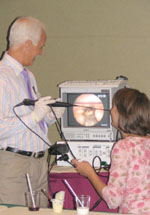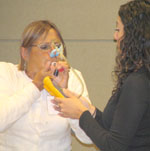Swallowing conference goal: better
patient care
by
Heather WoolwinePublic Relations
The Charleston Swallowing Conference in early October focused on the treatment of swallowing disorders in a setting created to foster international, national, and state collaboration for better patient care.
It was sponsored by the MUSC Evelyn Trammell Institute for Voice and Swallowing, Otolaryngology-Head and Neck Surgery, College of Health Professions-Communication Sciences and Disorders, and St. Joseph’s Hospital of Atlanta's Evelyn Trammell Voice and Swallowing Center.
 Dr. Steve Leder
demonstrates to another speech-language pathologist how to use
endoscopy in the treatment of swallowing disorders.
Dr. Steve Leder
demonstrates to another speech-language pathologist how to use
endoscopy in the treatment of swallowing disorders.“What we hosted was an innovative and intensive four-day program to educate and update clinicians on new approaches to treating a high probability of functional morbidity that exists with many diseases and disorders,” said Bonnie Martin-Harris, Ph.D., MUSC Evelyn Trammell Institute director. “We've made a lot of progress in the science and application of swallowing treatment and the meeting was phenomenal. I’ve never attended or hosted a conference that was met with so much enthusiasm by the attendees.”
Five hundred and fifty attendees discussed and learned about a variety of current issues relating to swallowing disorders. Surprisingly, more than 10 million Americans have difficulty swallowing, but frequently disorders are not diagnosed correctly, if they’re diagnosed at all.
“Swallowing disorders are very complex and involve overlapping systems. It’s not as simple as treating one particular component of swallowing, like the tongue for example, in isolation,” Martin-Harris said. “Successful treatment involves a team approach with speech-language pathologists linking with physicians to create an environment for functional rehabilitation through therapy.”
Martin-Harris feels that speech pathology should begin early in a patient’s care plan; instead of beginning therapy after swallowing problems develop. “We need to be thinking about the whole recovery in addition to fixing the most immediate problem such as treating a tumor or stroke” she said.
Under this philosophy, Martin-Harris and more than 30 colleagues from several disciplines involved in the treatment of swallowing disorders sought to bridge the gap between clinical research and practical knowledge.
The first day of the conference broached such topics as best evidence and best practices; experienced-based plasticity in terms of timing, repetition, and intensity; the upper digestive tract and it’s functional targets in treatment; cross system interactions; recording and stimulating muscles; electrical stimulation versus intramuscular stimulation; and oral exercise and its impact on functional change.
Day two claimed a more hands-on component with five forums designed to demonstrate new methods and equipment.
Lectures and additional forums in the remaining two days provided attendees with insight into treatment issues from a multidisciplinary perspective.
 Dr. Christine
Sapienza, right, helps another speech-language pathologist understand
respiratory muscle strength training by allowing her to experience it
herself.
Dr. Christine
Sapienza, right, helps another speech-language pathologist understand
respiratory muscle strength training by allowing her to experience it
herself.With an extraordinary amount of ground to cover, the conference’s theme of moving patient treatment from a general methodology to a more advanced, evidence-based plan pointed toward a need for increased knowledge not only of up-and-coming research and techniques, but also the affect the swallowing disorder can have on a condition and vice versa.
For instance, patients on feeding tubes or with certain conditions like multiple sclerosis often see atrophy within the muscles necessary for swallowing. Traditional measures suggested changing food and liquid intake to better match the current ability of a patient to ingest food. Though modified diet textures are often necessary, new ideology suggests that strengthening a patient’s muscles, similar to strengthening skeletal muscles, will improve that patient's functional status in the long run. This sometimes requires an upgrade in diet texture. “Appropriate treatment is derived from careful evaluation that includes a modified barium swallowing evaluation and/or fiberoptic assessment of swallowing function,” Martin-Harris said.
On a related topic, pneumonia as a result of entry of foods and liquids into the lungs, is commonly caused by a swallowing disorder. With treatment of swallowing disorders, cases of pneumonia and thus funds numbering in the thousands could be avoided.
In addition to hosting the conference, Martin-Harris is chair of the Board for Speciality Recognition in Swallowing and Swallowing Disorder and president-elect of the International Dysphagia Research Society.
For more information, call 792-6400 or visit http://www.musc.edu/etivs/.
Friday, Nov. 18, 2005
Catalyst Online is published weekly,
updated
as needed and improved from time to time by the MUSC Office of Public
Relations
for the faculty, employees and students of the Medical University of
South
Carolina. Catalyst Online editor, Kim Draughn, can be reached at
792-4107
or by email, catalyst@musc.edu. Editorial copy can be submitted to
Catalyst
Online and to The Catalyst in print by fax, 792-6723, or by email to
petersnd@musc.edu
or catalyst@musc.edu. To place an ad in The Catalyst hardcopy, call
Community
Press at 849-1778.